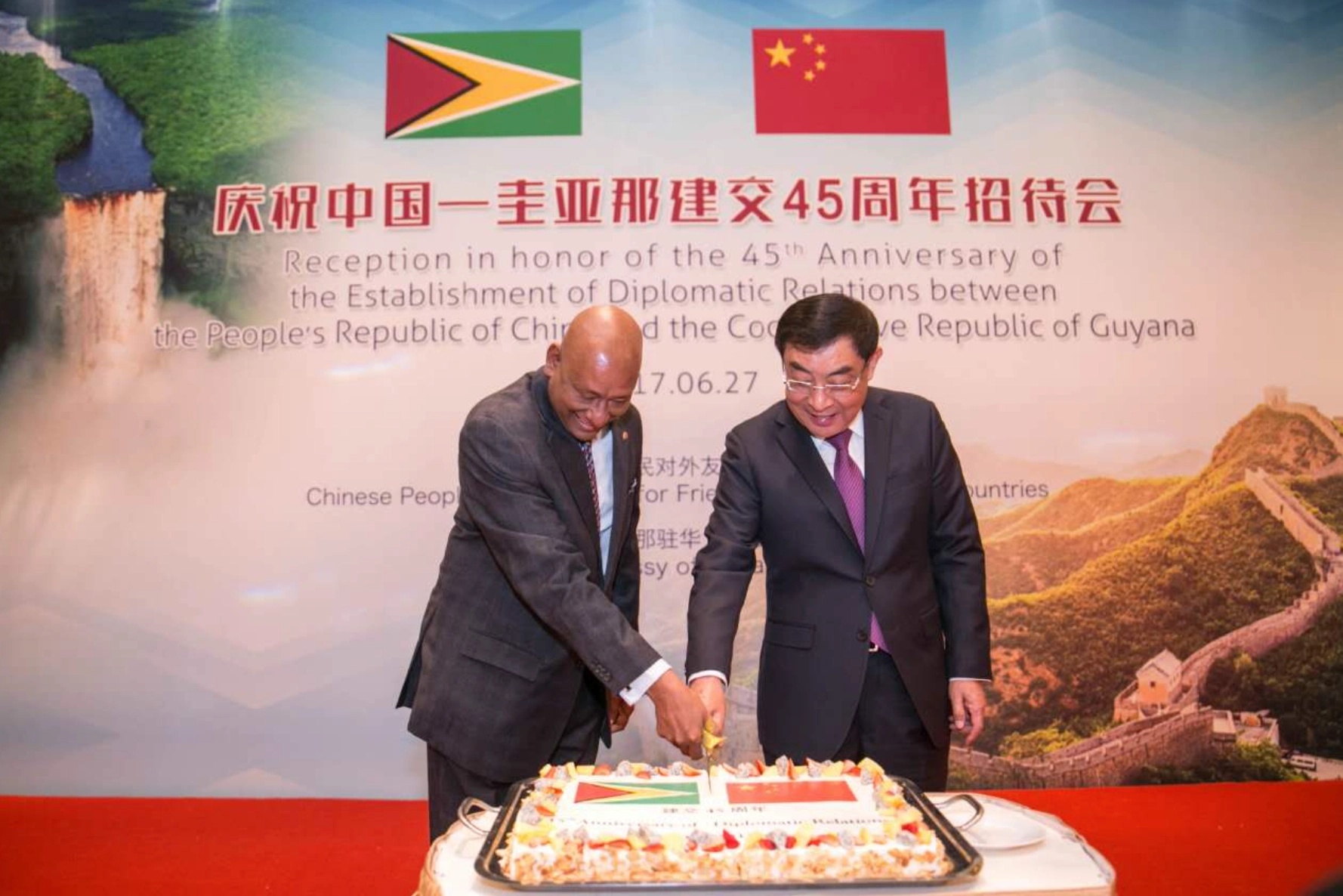In July 2023, during his meeting with Xi Jinping during the 31st “World University Games” in Chengdu, Guyana’s President Irfaan Ali expressed his “appreciation” for China’s new strategic framework to advance its “community of common destiny”: its Global Development Initiative, its Global Security Initiative, and its Global Civilizational Initiative. This underscores a renewed wave of Chinese engagement and influence in Guyana. Ali, whose government had announced in February 2021 its intention to open a trade office in Taiwan before pressure from China forced it to backtrack within hours, reaffirmed Guyana’s allegiance to the “one China” policy.
On trade, Ali announced Guyana’s intention to deepen its participation in July 2018 in China’s Belt and Road Initiative (BRI) by negotiating the signing of China’s “BRI Cooperation Plan,” including linking Guyana’s 2030 development strategy to the BRI. Ali also committed to establishing a Guyana-China “Investment and Economic Cooperation Working Group” to advance Chinese projects in the country.
Bilateral relations between the two countries deepened following the discovery and exploitation of over 25 billion barrels of recoverable oil in Guyana’s territorial waters by an Exxon-Mobil-led consortium. This boosted GDP growth by more than 25% per year and attracted new resources from both the oil sector and outside investors. China National Offshore Oil Company (CNOOC) entered as a 25% partner in the Exxon-led consortium.
But even before this relationship, China was already deeply committed to Guyana. Since the beginning of the 21st century, the Chinese presence in the country has been visible through companies such as Bosai Minerals Group; China Railway Road; China Harbour Engineering Corporation (CHEC); Beijing Construction Group or Eddie Boyer’s National Hardware.
In the security sector, the Asian giant has donated to Guyana’s security services, gifting a Y-12 military transport aircraft to the Guyana Defense Force, followed by 31 vehicles and other items donated in 2017. In the same year, it also donated $2.6 million worth of police cars, motorcycles, and other equipment.
Although China has emphasized the growth of trade with Guyana, the new influx of Guyana’s oil has so far, been reflected more in purchases than sales. According to the International Monetary Fund (IMF), Guyana’s $17 million in exports to China in 2022 was actually $4 billion less than in 2019, the year before its oil started coming online. Its imports during that time, however, nearly doubled from $218 million in 2019 to $372 million in 2022.
In October 2022, China and Guyana signed an air services agreement paving the way for direct air flights by Chinese airlines to Guyana, but the most visible expansion has been the projects its companies have won as Guyana has built up its commercial and public infrastructure.
In the construction sector, China Harbour Engineering Corporation (CHEC) has become a dominant player, with a $100 million expansion of Guyana’s legacy Pegasus hotel, plus the construction of a second Marriott property, among other infrastructure and mining properties and works.
In 2022, China Railway First Group, another Chinese conglomerate, was awarded a $184 million contract for the expansion of the East Coast rail and road system. Looking ahead, Ali’s government has also been in negotiations with to finance up to $600 million in various road projects.
In addition to road infrastructure, the Chinese are also interested in renewable energy projects, such as the Hope Beach wind and solar project. In addition, China State Construction and Engineering (CSCE) and China Dailan have studied the construction of a deepwater port in Berbice, in the east of the country, where the Canadian company CGX has built facilities to support the oil sector.
In the oil sector, Chinese investment has been minimal, beyond CNOOC’s participation in the Exxon-led coalition developing the Stabroek block. Even so, Ali’s government has invited China-based oil companies to participate in the auction of 14 new oil blocks.
In the telecommunications and surveillance sectors, Huawei has established a dominant position in the country. Ali’s government has contracted it to expand its surveillance systems nationwide, raising data security and privacy concerns for Guyanese.
At the government level, China’s ambassador to Guyana, Guo Haiyan, has actively sought to build relations with the Guyanese, including funding a “China-Guyana Friendship Park” on the west bank of the Demerara River. China has also expanded its training of Guyanese doctors through Chinese “medical aid teams.”
The U.S.-friendly Ali government does not intend to “choose” between the U.S. and China. Nor is the U.S. in a position to “overcome” China…although the significant Guyanese diaspora based in the country and the huge, albeit indirect, U.S. role in Guyana’s oil sector are important bases of influence.
* This text was originally published on the REDCAEM website.
** Translated by Janaína Ruviaro da Silva from the original in Spanish.











